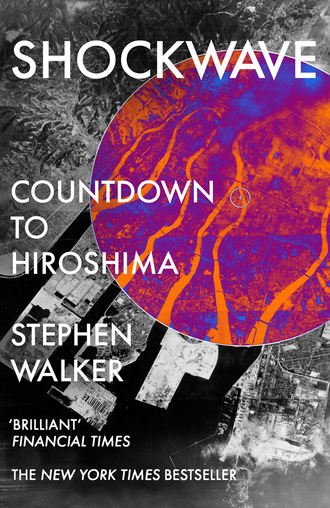
Полная версия
Shockwave
Even in Anderson’s lead-lined tank, the levels were beginning to rise. He did not stick around too long. At the edge of the crater, he quickly fired off a tethered rocket into the ground, scooping up samples of soil and Trinitite with a specially designed claw. Then he signaled the driver to return to base camp. Clumsily, the tank turned away from the crater, lumbering across the slippery green surface of bomb-blasted glass.
At 7:30 that evening, Secretary of War Henry Stimson was in his villa in Babelsberg when he received a cable from Washington. It came from George Harrison, his assistant at the Pentagon.
TOP SECRET Number WAR 32887 To Humelsine for Colonel Kyle’s EYES ONLY from Harrison for Stimson.
Operated on this morning. Diagnosis not yet complete but results seem satisfactory and already exceed expectations. Local press release necessary as interest extends great distance. Dr. Groves pleased. He returns tomorrow. I will keep you posted.
Stimson immediately replied:
From: TERMINAL To: War Department To Secretary General Staff for Mr. George L. Harrison’s EYES ONLY. From Stimson. TOP SECRET
I send my warmest congratulations to the Doctor and the consultant.
Stimson left his villa and crossed over to the Little White House. He found Truman sitting in his drawing room with Jimmy Byrnes swatting mosquitoes. It was a warm summer’s evening, and the windows were open to the lake and the gardens. The president scanned Harrison’s cable. “I feel fine,” he said, “it’s taken a great load off my mind.” Then he told an old Kansas joke about a girl who said she would drown herself if she discovered she was pregnant. It is not recorded if any of his audience laughed.
LATER THAT EVENING, Stimson returned to his villa. Somewhere still in his office were the “Magic” intercepts he had read earlier that day. They were all there: the Japanese ambassador’s hard-headed realism, the Japanese foreign minister’s desperate pleas for an honorable surrender. In those carefully translated, typewritten pages lay exposed the latest chapter in Japan’s stumbling steps toward some kind of peaceful solution. But now there was a new dimension. Now there was the bomb: no longer a putative threat, but a physical, achieved, brutal actuality.
Perhaps, thought Stimson, there was still a bridge across which the president and the Japanese could meet. Perhaps Truman could yet be persuaded to let the Japanese keep their emperor, to give them the honorable surrender their foreign minister craved. The more moderate, unfanatical parties in Japan might yet be encouraged to deliver a peace before this man-made Frankenstein destroyed them all.
Stimson prepared for bed. The old, tired, aristocratic statesman who had nursed the bomb through the long wilderness years would try once more to prevent it from being actually used. As the secretary of war, he knew better than anybody just how little time was left.
THE USS Indianapolis set sail at exactly eight o’clock in the morning, Pacific War Time, just three and a half hours after Trinity blew its great glass hole in the ground. The crew were at morning colors as the heavy cruiser eased under the Golden Gate Bridge thirty-six minutes later.
In happier times, she had carried President Roosevelt on his tour of Latin America. He had famously dined off fresh venison in her mess and watched Laurel and Hardy movies in her cinema. Now she carried a crate and a bucket and two fake artillery officers who sat in their cabin day and night with a padlock and a key and a Geiger counter.
On the bridge, Captain McVay rang for full speed. The ship’s 107,000-horsepower engines turned her four massive screws faster and faster in the water. A boiling white wake of foam marked her path as she cut through the waves, unescorted and alone, out into the open ocean.
The dress rehearsal was over.
ACT II DECISION JULY 18–28, 1945
The responsibility taken by Mr. Truman was essentially, I think, the responsibility taken by a surgeon who comes in after the whole patient has been opened up and the appendix is exposed and half cut off and he says, “Yes, I think he ought to have out the appendix—that’s my decision.”
GENERAL LESLIE GROVES
The atomic bomb was no “great decision.” … Not any decision you had to worry about.
PRESIDENT HARRY TRUMAN
Конец ознакомительного фрагмента.
Текст предоставлен ООО «ЛитРес».
Прочитайте эту книгу целиком, купив полную легальную версию на ЛитРес.
Безопасно оплатить книгу можно банковской картой Visa, MasterCard, Maestro, со счета мобильного телефона, с платежного терминала, в салоне МТС или Связной, через PayPal, WebMoney, Яндекс.Деньги, QIWI Кошелек, бонусными картами или другим удобным Вам способом.



